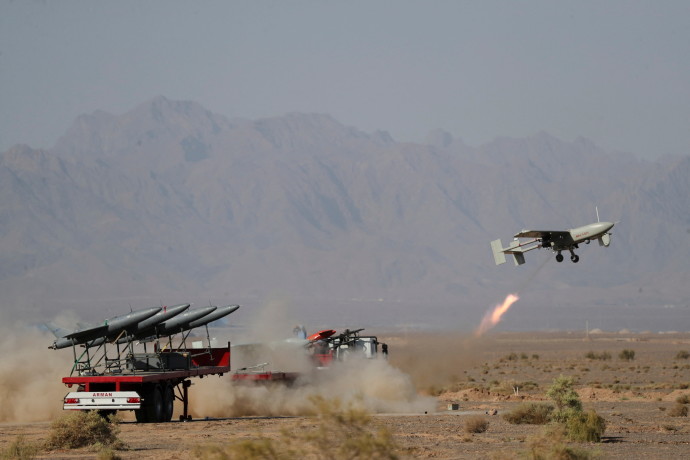Russia has quietly reached an agreement with Iran to begin manufacturing hundreds of weaponized drones on Russian soil, according to new intelligence seen by the US and other Western security agencies, the Washington Post has reported.
Officials from Moscow and Tehran finalized the deal during a meeting in Iran in early November, accelerating the exchange of key components and designs that would allow production to begin within months.
If the new agreement is fully realized, it would signify a further deepening of a Russian-Iranian alliance that has slowly been forming in light of Moscow’s faltering military campaign in Ukraine. As the two countries grow closer, Iran has already provided crucial support for Russia during its war.
By moving drone production lines directly into Russia, Moscow could quickly replenish its dwindling munition stockpile with relatively inexpensive but highly destructive weapons systems that have recently begun playing a much larger role in the nine-month-old Ukrainian war.
While the newly provided weapons could give a significant boost to Russia's failing war efforts, as well as provide a much-needed economic boost to isolated Iran, Iran's clerical rulers face mounting international pressure over their military alliance with Moscow.

In a separate delegation, Russian Security Council Secretary Nikolai Patrushev met Iran's President Ebrahim Raisi on November 9. The two discussed, among other topics, the economic sanctions and other “Western interferences” interfering with both countries, according to state-run Russian and Iranian news media.
Russian Security Council secretary Nikolai Patrushev's visit was a sign of Iran's growing importance as a supportive partner and weapons supplier at a time when Moscow is isolated by Western sanctions and faces intense Ukrainian military pressure.
Tehran growing closer to Russia under shadow of Western isolation
Tehran has sought to portray itself as neutral in the Ukraine conflict so far, but more and more Iranian-made drones are found to be used to attack Ukrainian cities, triggering threats of new economic sanctions from the West.
Emboldened by high oil prices since the Ukraine war, Iran is betting that with Russia's support it could pressure Washington to offer concessions for the revival of its 2015 nuclear deal with world powers.
Forming a real alliance with a superpower that shares anti-Western views and is not afraid of pushing such views on the battlefield is a strategic move designed to show Iran is not isolated.
Iran’s leaders may be attempting to avert these new sanctions, however, by moving the physical assembly of the drones to Russian soil, the officials said, according to the Washington Post.
The Iranian drone industry is already spreading to other countries. Iran opened a drone factory in Tajikistan in May, which produces the Ababil-2 drone capable of reconnaissance and combat, according to the Eurasia Times.
Iran promises to supply Russia with missiles, drones
Iran has already promised to provide Russia with surface-to-surface missiles, in addition to more drones, last month, according to Iranian officials, a move that has infuriated the United States and other Western powers which are backing Ukraine in the war.
The Islamic Republic says its drones are the region's most powerful. In addition to surveillance, they can be used for attacks, either by dropping munitions or as so-called "kamikaze drones" that fly into a target and blow themselves up. Its advanced long-range suicide drone is designed to hit Israel's Tel Aviv.
Ukraine's President Volodymyr Zelensky warned last month that Tehran is actively supporting Moscow with drones in its invasion in exchange for getting assistance to develop its nuclear program.
Speaking at the Haaretz Democracy Conference, Zelensky said that the Islamic Republic would have not been able to send equipment to Russia if Israel had not taken a neutral stance in the Ukraine war.
“In eight months of full-scale war, Russia has used almost 4,500 missiles against us. And their stock of missiles is dwindling. Therefore, Russia went looking for affordable weapons in other countries to continue its terror. It found them in Iran,” Zelensky said.
“In eight months of full-scale war, Russia has used almost 4,500 missiles against us. And their stock of missiles is dwindling. Therefore, Russia went looking for affordable weapons in other countries to continue its terror. It found them in Iran,”
Volodymyr Zelensky
Zelensky’s remarks come as the Ukrainian Defense Ministry's Intelligence Directorate claimed that Russia's infantry are being provided with Iranian-made body armor and helmets, and new groups of Iranian instructors are also arriving in Russia to train them on the use of a new and more lethal type of drones, Arash UAVs, according to Iran International.
Reuters contributed to this report.
